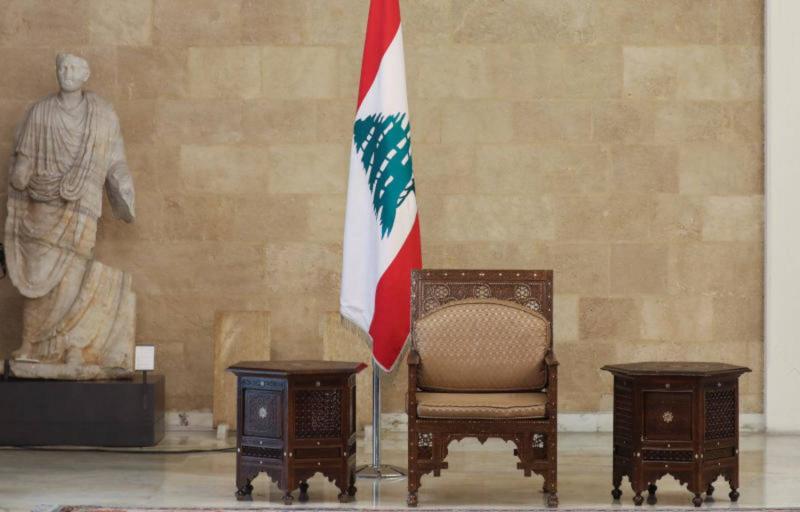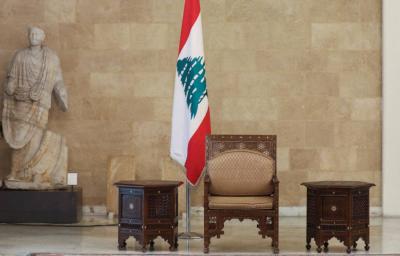Those observing the internal political scene note that there are many initiatives but little productivity. The movements of diplomats and envoys heading to Beirut confirm that it remains a stagnant flow amidst considerable pessimism regarding the election of a president during September. This month includes an initiative called for by Speaker of the House Nabih Berri, which revolves around a seven-day dialogue, after which there would be open parliamentary sessions to elect a president. A source close to Ain al-Tineh stated to "Warda" that Berri sought to meet the demands of both the ruling and opposition factions, aiming to combine dialogue with sequential sessions for presidential elections. It is emphasized that this invitation does not imply that the initiative by French presidential envoy Jean-Yves Le Drian, who will arrive in Lebanon soon, has "failed before it even started," especially following French President Emmanuel Macron's stance on Iran and accusations of its interference in Lebanese affairs and obstruction of the presidential process.
Despite Maronite Patriarch Bechara al-Rahi showing support for Berri's call by urging lawmakers to enter dialogue "without preconceived judgments or an intention to impose ideas and projects," the response came just hours later from Samir Geagea, leader of the Lebanese Forces Party, who launched an attack on the "resistance team" (Hezbollah and its allies), referring to the call for dialogue as an attempt to "strangle and kill you and force you to do what they want." Meanwhile, Sami Gemayel, leader of the Kataeb Party, questioned, "Should I come to the dialogue like a sheep going to slaughter?"
As for Le Drian's initiative, if it is not adjusted and presented in an acceptable and realistic format, as noted by an opposition MP to our site, it is marked for failure after the repeated declarations of opposing Christian parties that they are not concerned with any dialogue regarding the constitutional entitlement, as the law is clear on this matter. This means that "September's political yield" will not be abundant; rather, the presidential basket will be empty, especially as Le Drian's next destination will be Saudi Arabia, where he will take on his new role as head of the French Development Agency in Al-Ula. At that point, it remains uncertain where Lebanon will stand on his list of priorities.
It is not unlikely that we may reach an impasse that opens the door to all scenarios. Amid all this uncertainty, reports speak of serious and intensive Qatari efforts to resolve the presidential crisis, with their new ambassador to Lebanon, along with diplomats and envoys, conducting a series of meetings and communications with various parties in hopes of facilitating Le Drian’s mission or unraveling some of the obstacles facing his initiative. Meanwhile, media reports highlighted an Arab and international push to end the presidential vacancy in Lebanon, particularly after Acting Governor of the Central Bank Wassim Mansouri raised the alarm by announcing his adherence to the Central Bank's decision not to lend the government in either dollars or Lebanese lira, meaning it must manage its affairs independently.
It is noted that the Qatari approach toward political forces focuses on three names: Army Commander General Joseph Aoun, MP Neemat Frem, and former Minister Ziad Baroud. However, in recent days, the name of the Army Commander has gained prominence from various political quarters after previous statements indicated that the five-member committee was set to propose candidate names. It is likely that there is an agreement among its members on the Army Commander’s name, especially since Qatar has sensed a convergence among many parties regarding him, except for the Free Patriotic Movement.
In this context, preparations are underway for a soon-to-be-held meeting among the foreign ministers of countries represented in the five-member committee to follow up on developments in Lebanon, which was the main topic of the meeting in Bkerke between Patriarch al-Rahi and Saudi Ambassador Walid Bukhari. Thus, there are very slim hopes for both Le Drian's and Berri’s initiatives. Some consider that Le Drian is singing a tune separate from the committee that, in its last statement, called for the election of a president through the constitution, without conditions, threatening sanctions against anyone impeding the electoral process. Meanwhile, pro-government parties assert that no president will be elected without dialogue and discussion among all components, leading to an agreement on a name.
These realities raise the question: Does Berri’s initiative undermine Le Drian’s proposals, or is it a preemptive step in response to the negative stance of President Macron toward Iran, leading Tehran to pull the "carpet from under Paris’ feet"? Is Qatar playing the role of mediator or preparing the ground to ensure the success of Le Drian's initiative by smoothing out differences, especially since the Army Commander’s name is strongly proposed in the discussions, particularly as he is supported by Qatar and the U.S., with committee members not objecting to him?
One former MP involved confirmed in a statement to "Warda" that the indicators do not indicate that Le Drian's initiative will succeed, and matters are not heading in the right direction. Meanwhile, Qatar continues its communications with all parties in Lebanon, without dismissing the issue of oil exploration, yet currently, there is no Qatari initiative; however, there is a significant likelihood of Qatar entering the fray forcefully as a key player in the presidential entitlement.
Regarding Berri’s recent initiative, according to the same source, it cannot be said that he is circumventing French proposals or preempting Le Drian's anticipated step for two reasons: Firstly, because Berri has called for dialogue since the beginning of the vacancy. Secondly, the impression is that the French initiative ends by encouraging the candidacy of Sleiman Frangieh, who is supported by Berri. It is a positive and encouraging message for everyone that dialogue is a duty.
In conclusion, despite the movement we are witnessing on the domestic front, the results are uncertain, and the risk is great given the erosion of resilience, as seen across various sectors. It is not unlikely that we could reach a deadlock whose repercussions open up to all scenarios.
Members of Parliament have the freedom to take the appropriate stance, especially if it becomes clear that there is some kind of deceit in the invitation. In parallel, while Patriarch al-Rahi receives ambassadors of countries concerned with the Lebanese issue, including the Saudi and new French ambassadors to Lebanon, Herve Magro, his sermon last Sunday raised many questions: Why did Patriarch al-Rahi support Berri's call for dialogue after previously believing that the path for the presidential entitlement is clear in the constitution? What does he hear from the ambassadors regarding the presidential entitlement?
A church source from Bkerke clarified to "Warda" that the patriarch has a primary goal centered around electing a president after ten months of vacancy, and he knows who is obstructing the presidential path. He addresses this in his weekly sermons. There is a faction that wants to negotiate about the president before the election, and another that rejects this notion. The patriarch does not choose between the two sides; he has not said that he supports dialogue however it may be or under any conditions, but he said there is a constitutional duty for all MPs to perform by going to Parliament to elect a president.
If electing the president requires a few days of discussion to agree not on the person of the president but on the program, then the dialogue will have achieved its purpose. If this discussion does not take place concerning this matter, parliamentarians have the freedom to take appropriate stances, especially if there is evidence of deception in the call for dialogue; they are not small or childish and can make the right decision.
Regarding the meeting between the patriarch and the Saudi ambassador, the source noted that they discussed the presidential entitlement, and he is well aware of what is happening and who is obstructing. Views were exchanged on what could be done to resolve this crisis or impasse. As for the meeting with the French ambassador, it was more of a protocol nature; the ambassador introduced himself to the patriarch, who has a vision of the situation in Lebanon, but there was no in-depth conversation, and they did not address the presidential entitlement because the ambassador wants to delve deeper into Lebanese affairs.




